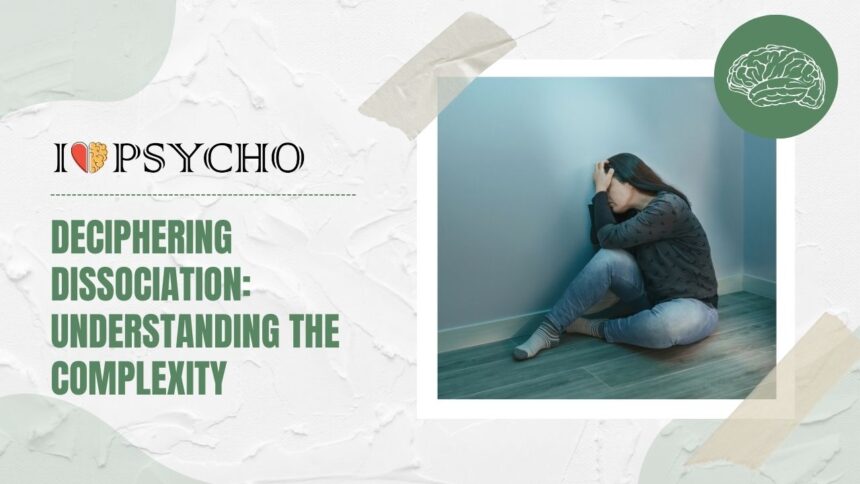Have you ever felt like you were floating outside of yourself, watching the world pass by as if in a dream? That sensation of detachment and disconnection is just one aspect of dissociation, a complex and often misunderstood phenomenon. In this blog post, we will delve into the intricacies of dissociation, exploring its various types, causes, symptoms, treatment options, coping strategies, and most importantly – breaking the stigma surrounding dissociative disorders. Let’s unravel the mysteries together!
Defining Dissociation
Dissociation is like wearing a mask, hiding your true self behind a facade that blurs the lines between reality and fantasy. It’s a coping mechanism where the mind separates from thoughts, feelings, memories, or even identity to protect itself from overwhelming stress or trauma. Imagine feeling as though you’re observing your own life from afar, disconnected from emotions and sensations as if trapped in a haze.
This state of detachment can manifest in various forms – amnesia, depersonalization, derealization – each presenting its unique challenges. Dissociative disorders are not simply daydreaming or zoning out; they disrupt daily life and relationships profoundly.
Understanding dissociation goes beyond surface-level observations; it requires delving deep into the psyche to unravel the complexities that lie beneath the surface. By shedding light on this intricate mental process, we aim to foster empathy and awareness towards those navigating these turbulent waters of dissociative experiences.
The Different Types of Dissociation
Dissociation is a complex phenomenon that can manifest in various forms, each with its own unique characteristics.
One type of dissociation is depersonalization, where individuals feel detached from themselves as if observing their own actions from the outside. It’s like living in a dream-like state.
Another type is derealization, which involves feeling disconnected from one’s surroundings or experiencing the world as unreal or distorted. Everything around may seem foggy or distant.
Amnesia is yet another form of dissociation where there are gaps in memory, often surrounding traumatic events. People may not remember important aspects of their past experiences.
Identity confusion occurs when individuals have a fragmented sense of self and struggle to define who they are. They may feel like different parts of them don’t fit together cohesively.
Understanding these different types of dissociation can shed light on the complexity of this psychological phenomenon and how it impacts individuals’ daily lives.
Causes and Triggers of Dissociation
Dissociation can be triggered by a myriad of factors, ranging from early childhood trauma to overwhelming stress in adulthood. Traumatic experiences such as abuse, neglect, or witnessing violence can significantly impact the development of dissociative disorders.
Individuals who have endured repeated traumatic events may use dissociation as a coping mechanism to distance themselves from the pain and distress associated with their past experiences. Additionally, chronic stress or ongoing interpersonal conflicts can also serve as triggers for dissociative symptoms.
Moreover, genetic predisposition and neurobiological factors play a role in the development of dissociative disorders. Research suggests that individuals with a family history of mental health conditions may be more susceptible to experiencing dissociation.
It is essential to recognize that each person’s experience with dissociation is unique, and what may trigger one individual could differ for another. Understanding the various causes and triggers of dissociation is crucial in providing effective support and treatment for those struggling with these complex issues.
Symptoms and Signs of Dissociation
Have you ever felt like you were watching yourself from afar, as if you were disconnected from reality? This sense of detachment is a common symptom of dissociation. Individuals experiencing dissociation may feel like they are in a dreamlike state or have an altered perception of time and space.
Other signs can include memory lapses, where gaps in recollection disrupt daily functioning. Some may also experience identity confusion or a feeling of being fragmented into different parts. It’s important to note that these symptoms vary in intensity and frequency among individuals.
Physical manifestations such as headaches, dizziness, and numbness are also linked to dissociative episodes. Emotional numbness or a lack of emotional response to events can be distressing for those affected by dissociation.
Recognizing these signs early on can lead to seeking appropriate help and support for managing the complexities of living with dissociation. Keep an eye out for these subtle yet significant cues that your mind might be trying to tell you something deeper about your mental health.
Treatment Options for Dissociative Disorders
For individuals experiencing dissociative disorders, seeking treatment is crucial in managing the condition effectively. There are various approaches to treating dissociation, tailored to each individual’s unique needs.
Therapy, such as cognitive-behavioral therapy (CBT) and dialectical behavior therapy (DBT), can help individuals understand their thoughts and behaviors better. Additionally, Eye Movement Desensitization and Reprocessing (EMDR) therapy can be beneficial for processing traumatic memories linked to dissociation.
Medication may also be prescribed by healthcare professionals to alleviate symptoms associated with dissociative disorders. However, medication alone is usually not sufficient for comprehensive treatment.
Incorporating holistic approaches like mindfulness techniques or art therapy can also complement traditional methods of treatment. It’s essential for those with dissociative disorders to work closely with mental health professionals in developing a personalized treatment plan that addresses their specific needs.
Coping Strategies for Those Living with Dissociation
Living with dissociation can be a challenging journey, but there are coping strategies that can help individuals navigate this complex experience. One key strategy is grounding techniques, which can help bring a person back to the present moment when they feel disconnected from reality. This could include focusing on sensory experiences like touch or smell.
Creating a safe space is also essential for coping with dissociation. Having a designated area at home or carrying comforting objects can provide a sense of security during difficult times. Building a support network of understanding friends and family members who can offer empathy and reassurance is crucial in managing dissociative episodes.
Engaging in relaxation techniques such as deep breathing exercises, meditation, or yoga can help reduce stress and promote emotional regulation. Seeking professional therapy like cognitive-behavioral therapy (CBT) or dialectical behavior therapy (DBT) tailored to address dissociation symptoms is vital for long-term healing and recovery. Remember, it’s okay to ask for help and prioritize self-care while navigating the complexities of living with dissociation.
Breaking the Stigma Surrounding Dissociative Disorders
Let’s delve into the importance of breaking the stigma surrounding dissociative disorders. People living with these conditions often face misconceptions and judgment from others, leading to feelings of isolation and shame.
Education is key in challenging stereotypes and promoting understanding. By increasing awareness about dissociation and its complexities, we can help create a more empathetic and supportive environment for those affected.
It’s crucial to listen without judgment and offer compassion to individuals struggling with dissociative disorders. Instead of stigmatizing their experiences, let’s strive to validate their feelings and provide them with the care they deserve.
Breaking the stigma requires open conversations, destigmatization efforts, and advocacy for mental health resources. Together, we can foster a community that embraces diversity in experiences and promotes acceptance for all individuals facing dissociation challenges.
Conclusion
Understanding dissociation is a crucial step in supporting individuals who experience this complex phenomenon. By recognizing the different types, causes, and symptoms of dissociation, we can better comprehend the challenges faced by those living with dissociative disorders. It’s important to break the stigma surrounding these conditions and offer empathy and support to those who are struggling.
With proper treatment options and coping strategies, individuals dealing with dissociation can learn to manage their symptoms and improve their quality of life. By raising awareness and fostering a more compassionate understanding of dissociative disorders, we can create a more supportive environment for those affected.
Remember, reaching out for help is not a sign of weakness but rather a courageous step towards healing. Let’s continue to educate ourselves and others about dissociation so that we can provide the care and compassion needed for all individuals on their journey towards wellness.









